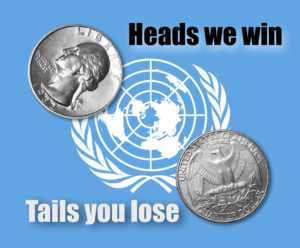This case was the snowball….. and all the work had been done once already so it seemed a shame not to carry on.
The whole graffitti-gate fiasco was the biggest crock of nonsense since Edward Lear tried to explain the Offside Rule after a bit too much cooking sherry, but none of that mattered. Not only did it have R-E-T-A-L-I-A-T-I-O-N written all over it, the “investigation” had more holes than a string vest, the UN had played fast and loose with the procedures from the beginning and it the biggest mystery of all was how it had been humanly possible to make such a total mess at every opportunity.
Even for OIOS (an office not unfamiliar with investigative disasters) this one was a train wreck of Biblical proportions. So of course it came as no surprise that the final decision on the UN should ignore all of that and confirm that I was 100% wrong 100% of the time! What other finding could there possibly be?
Two weeks after my contract had run out, and fifteen months after I made the comment, the UN decided that they were not going to “pursue” the matter further…… except for that they were, because I was getting a written reprimand.
 This is the UN; where they can say that they are not imposing a punishment in the same letter as does actually impose a punishment. Don’t worry about it. Naturally, the Organization chose to ignore all of the biases, the double standards, the conflicts of interest and the incompetence that had brought them to this point, that was all perfectly acceptable. All of that was ignored EXCEPT for one thing; they had to dismiss my defence of ‘freedom of speech’ under the Universal Declaration of Human Rights.That was the cherry on the top, or alternatively a banana skin underfoot – but the only thing that UN insisted on commenting on was that the Secretary-General specifically concurred with the finding of Mr. Richard Bridle, (Director of the Division of Human Resources (UNICEF)) that my comment was not protected under the freedom of opinion as enshrined in the Universal Declaration of Human Rights.
This is the UN; where they can say that they are not imposing a punishment in the same letter as does actually impose a punishment. Don’t worry about it. Naturally, the Organization chose to ignore all of the biases, the double standards, the conflicts of interest and the incompetence that had brought them to this point, that was all perfectly acceptable. All of that was ignored EXCEPT for one thing; they had to dismiss my defence of ‘freedom of speech’ under the Universal Declaration of Human Rights.That was the cherry on the top, or alternatively a banana skin underfoot – but the only thing that UN insisted on commenting on was that the Secretary-General specifically concurred with the finding of Mr. Richard Bridle, (Director of the Division of Human Resources (UNICEF)) that my comment was not protected under the freedom of opinion as enshrined in the Universal Declaration of Human Rights.
Now it is not impossible that they are all smoking some funny stuff over there in UNICEF, I have no idea – but why anyone would willingly step on this particular banana skin is just one of life’s little mysteries.
Mr. Bridle ignored the questionable origins of the complaint. He ignored Lapointe’s conflict of interests. He ignored the Panels conflicts of interests. He ignored the factual basis of the comment. He ignored Dudley’s evidence disassociating himself with the complaint. He ignored the panel’s failure to prove anyone even saw the comment. He ignored the panel’s failure to establish the elements of harassment. He ignored the missing audio recording. In short, he ignored everything it was possible to ignore, EXCEPT to interpret the Universal Declaration of Human Rights, and thus causing us all to wonder if the UN is entirely run by narcissists or whether their excuse is that they really have been smoking that funny stuff.
 Now, the UN insists that Julian Assange is being unlawfully detained, and his self-imposed exile is a breach of his Human Rights, and Edward Snowden is hailed as a hero who should be protected – because in their case, Freedom of Speech clearly takes precedence over the criminal law. In my case, however, which was far from even slightly criminal in the remotest sense – making a reference to a finding of fact by a UN judge in a UN Tribunal is not protected by Freedom of Speech under the Universal Declaration of Human Rights, because “this freedom is subject to reasonable restrictions, including the requirement to act in accordance with the United Nations Staff Regulations and Staff Rules.”
Now, the UN insists that Julian Assange is being unlawfully detained, and his self-imposed exile is a breach of his Human Rights, and Edward Snowden is hailed as a hero who should be protected – because in their case, Freedom of Speech clearly takes precedence over the criminal law. In my case, however, which was far from even slightly criminal in the remotest sense – making a reference to a finding of fact by a UN judge in a UN Tribunal is not protected by Freedom of Speech under the Universal Declaration of Human Rights, because “this freedom is subject to reasonable restrictions, including the requirement to act in accordance with the United Nations Staff Regulations and Staff Rules.”
It is comforting to know that the considered opinion of the Secretary-General of the United Nations is that UN Staff Rules are so supremely important that they not only take precedence over the criminal law, they take precedence over National Security considerations and they take precedence over the Universal Declaration of Human Rights.
Somebody somewhere seems to have this back-asswards….. and of course; it could be me. I used to think I had an understanding of what constituted ius cogens, but I could be mistaken.
So, let the games begin……..
At first the Registrar tried not to accept the Application – because this is the UN, of course, and far from being impartial, absolutely every office involved wants to see you fail.
The rules state that the Application should not be more than 10 pages.
I fully agree. The Applications shouldn’t be more than 10 pages long, but  at the same time, the Organization shouldn’t make so many spectacular blunders in a simple disciplinary case that it takes more than that to explain them all.
at the same time, the Organization shouldn’t make so many spectacular blunders in a simple disciplinary case that it takes more than that to explain them all.
The rules, of course, say “should” not “shall” – so one can argue that it’s advisory not compulsory. They grudgingly accepted it.
 The UN is nothing if not tenacious in their resistance. Nobody cares abut the money they are spending, it is just important never to concede anything; UN management must always be right, even when they are wrong, and the staff member must always be wrong, even when he is right.
The UN is nothing if not tenacious in their resistance. Nobody cares abut the money they are spending, it is just important never to concede anything; UN management must always be right, even when they are wrong, and the staff member must always be wrong, even when he is right.
What the Respondent wanted to do was use the very same tactic as they had used against von der Schulenburg; which is key to using “misconduct investigations” to attack any potentially rebellious staff member in such a way that it complies with the rules – so OIOS can be used the “private Gestapo” in such a way that it cannot be challenged in the UN Dispute Tribunal and ipso facto – must therefore all be quite “legal”. This involves the UN taking a very selective view of only those facts that suits their pre-agreed ojective, using a misconduct investigation to harass the guy to death and then, at the last minute, giving him a slap on the wrist that they can call “administrative” rather than “disciplinary” and so prevent him from challenging the decision in the Tribunal.
The basis of their argument was (1) receivability (as usual). The UN argued that the the action was not receivable by the Tribunal because I had not requested Management Evaluation. Disciplinary decisions do not require a management evaluation but a letter of reprimand was not “disciplinary” (even though it came at the end of the disciplinary process) so they said it did. I long ago reached the conclusion that MEU evaluations serve absolutely no useful purpose, but lets not go there…. Counsel for the Respondent also dismissed absolutely everything on (2) merits, describing these concerns as “immaterial.”
Why were they “immaterial”? Because I had “admitted to have altered the comment and to have circulated his memorandum to all staff members in OIOS, and it cannot be contended that it was unreasonable to issue the Applicant a reprimand for these actions, which is what ultimately occurred.” That encapsulates the Respondent’s case in a nutshell.
When I went to university, it really was considered important to demonstrate an understanding of the law, and all the Law Faculties in all the universities in the country were agreed on that point. I have absolutely no idea where anyone else got their education, or how…..but perhaps I just expect a higher standard that will get you a job in the UN.
Yes, of course I “admitted to have altered the comment” – but in order for that to constitute misconduct and specifically for it to consitute ‘h ‘harassment’ contrary to ST/SGB/2008/5, Section 1.2, the investigation still has to prove the elements of ‘harassment.’
The reason there that Section 1.2 even EXISTS is to put the burden of proof on the Secretary-General to show that that comment was, for a start, “improper.” For that to be the case, the UN would have to defend Michael Dudley’s conduct in withholding and changing the photographs that were evidence in the 0052/09 investigation in the first place. Then they have to show that it was my comment and neither (a) the Nguyen-Kropp & Postica judgement or (b) the Associated Press news story, that caused “offence or humiliation.” Then they would have to explain why the Fact Finding Panel failed to find a single witness who actually saw my offending comment….
ALS were free to try if they wanted. I don’t think they wanted to.
It is also very true that I “circulated a memorandum to all staff members in OIOS” – I did that – but to be clear – the date on that was 5 February, the date of the whiteboard comment was 14 January. I would be interested to know how something on 5 February was material evidence of something which Lapointe had already declared I was guilty of on 17 January.
No prizes for guessing why the Secretary-General’s best and brightest legal brains didn’t want to get into the details of that one either.
If they even bothered to read the memo, they would see that would put the UN into a position where they would have to argue that my concerns about protecting the reputation and the credibility of OIOS were “improper.”
The UN, of course, never actually deals with the underlying facts of anything, they prefer to defend the procedure, even when that was just as flawed
Their conclusion: “it cannot be contended that it was unreasonable to issue the Applicant a reprimand for these actions, which is what ultimately occurred” is interesting. On its own, that even makes sense; IF I had got a reprimand on 14 January, that would not have been unreasonable and there would not be a damn thing I or anyone else could do about it.
If, of course, what Michael Stefanovic gave me was a reprimand…. that opened the door to all sorts of questions about stuff like “double jeapardy” and “bad faith” and assorted other nasties better left well alone. The problem was that Lapointe had not been satisfied with any simple reprimand I got from Stefanovic; she had been looking for an opportunity to get rid of me ever since I complained about how she failed to handle my original complaint which was against Dudley as well as Dzuro & Baldini. (If you have an English dictionary; look up the word ‘retaliation.’) Any criticism of Dudley’s behaviour that was exposed in the Nguyen-Kropp & Postica judgement did not reflect well on Lapointe either. She had narrowly escaped being called as a witness to explain why she had dragged her feet to clear Ms. Nguyen-Kropp & Mr. Postica, and was now refusing to suspend Dudley and the others named in that judgement. (If you still have that English dictionary out; look up ‘conflict’ to see if it defines ‘conflict of interests’ as well.)
 Having gone down the road of an investigation for ‘harassment’ however, the Organization was committed to that course of action and they could only take action against me for ‘harassment’ if they could prove the elements of ‘harassment’…. and also rebut my claims of bias and conflicts of interest and I was clearly giving them far too good a run for their money.
Having gone down the road of an investigation for ‘harassment’ however, the Organization was committed to that course of action and they could only take action against me for ‘harassment’ if they could prove the elements of ‘harassment’…. and also rebut my claims of bias and conflicts of interest and I was clearly giving them far too good a run for their money.
It appears I have a bad habit of citing things called ‘facts’ and applying something called ‘the law’ and that is what the UN considers to be damn nuisance! Its so inconvenient. All that anyone ever wanted was a nice simple hanging – then I had to start throwing the law back in their faces, and stacking up arguments that Counsel for the Respondent would not touch with a 10’ pole.
As lynchings go, this one had certainly NOT gone to plan. The whole thing was a train wreck; even if the Administrative Law Section wanted to deny it, which they did.
Or at least, it should be fine, because the reason I filed an Application with the UN Dispute Tribunal is because I do not care what the Adminstrative Law Section want to say. They represent the Organization and their role is simply to deny everything.
They don’t actually make the decision.
Or at least, they shouldn’t make the decision, because the reason I filed an Application with the UN Dispute Tribunal is because a judge would make the decision.
The judge however was smart enough to see that this whole case was a ticking bomb, and it was due to go off in her court.
Now this is where it gets even more conspiratorial because the UN Dispute Tribunal judges are employed by the UN, and their job is to decide cases against the UN, and some of those judges are ad litem judges – which essentially means ‘casual labor’ judges retained on a case-by-case basis. That is all fine and well, but the money is good, and this is when one starts to wonder about how keen the judge might be to bite the hands that feeds them so generously.
And then, clearly unsatisfied with leaving me with even a notional (but pointless) victory, UN management waited 59 days and filed an Appeal.
Now the funniest bit about this was I actually agreed with the basis of their argument! How often does that happen?
It is patently ridiculous that someone can escape any sort of accountability for their misconduct simply by resigning from the UN. If that were allowed to happen, the “disciplinary system” would be even less effective than it is at the moment.
In the great scheme of things, if anyone wanted to put a letter of reprimand on my Official Status File; quite frankly, they are welcome to do so. It will be a very cold day in Hell before I would want to re-join the Organization; I’d sooner take a job playing the piano in a whorehouse. (Always assuming I could play the piano.)
What I did not agree with, however, was the same thing as I have never agreed with, and that is the Organization being able to make arbitrary decisions without addressing the substance of their complaints against an individual. Nobody had ever been willing to talk to me about the merits of anything.
Instead of actually responding to the Appeal, I was in half a mind to just send a bunch of flowers and tell them to get on with it, but I don’t believe that sore losers should actually be encouraged. I also had a few days slack time so I did respond! Why wouldn’t you?
That was plodding along nicely when all of a sudden, I got busy. It was not something foreseeable, but I was asked to assist someone who needed my help and I did. That meant I had to finish the response to the Appeal quickly and get rid of it.
The Registrar wouldn’t accept it.
If someone wants to tell me something, they are welcome to phone me up or send me an e-mail. If they want to just annoy me, however, a very good way of doing that is to issue orders from a ‘Do-Not-Reply’ email address. That is insulting and usually just succeeds in ticking me off, and on this case, it did – and I told them so.
The Registrar had the misfortune to catch me when I was travelling. (Ironically enough that was because I was helping anther UN Staff Member else who was being systematically persecuted by the UN for having been stupid enough to report misconduct – but never mind.)


